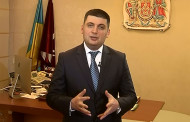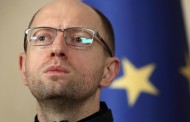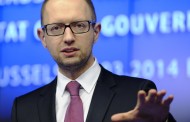Yves here. In addition to John Helmer’s report on how the US is keeping close tabs on its client state, Ukraine, via having State Department employee Natalie Jaresko serve as Finance Minister, reader YY pointed out that the German press was reporting the story:
I have a sneaking suspicion that the US media won’t take notice of Natalie Jaresko’s new appointment and on the accusations of her former husband that she made an improper loan out of an investment company heavily, if not entirely, funded by the US government. As Helmer writes:
It hasn’t been rare for American spouses to go into the asset management business in the former Soviet Union, and make profits underwritten by the US Government with information supplied from their US Government positions or contacts. It is exceptional for them to fall out over the loot.
The new finance minister of Ukraine, Natalie Jaresko, may have replaced her US citizenship with Ukrainian at the start of this week, but her employer continued to be the US Government, long after she claims she left the State Department. US court and other records reveal that Jaresko has been the co-owner of a management company and Ukrainian investment funds registered in the state of Delaware, dependent for her salary and for investment funds on a $150 million grant from the US Agency for International Development. The US records reveal that according to Jaresko’s former husband, she is culpable in financial misconduct.
Natalie Jaresko was appointed on Monday, and approved by a vote of the Verkhovna Rada on Tuesday evening. A presidential tweet and an announcement from the office of President Petro Poroshenko say a decree has been signed granting Jaresko Ukrainian citizenship to qualify her to take office. The legality of the decree was challenged today by the head of Poroshenko’s bloc in parliament, Yury Lutsenko.
On Tuesday at the State Department, spokesman Marie Harf was asked: “apparently a U.S. national has been appointed finance minister. Has Washington something to do with this appointment?” Harf replied: “No, this is a choice for the Ukrainian people and their elect [sic] representatives. This is their decision. Certainly, I don’t think we had anything to do with it at all… the Ukrainian people and their representatives are able to pick whoever they want to be part of their government. That’s the beauty of how this process works.”
Jaresko was born into the Ukrainian émigré community of Chicago, taking her name from her father John Jaresko. Her brother, also named John, has been active in Ukrainian movements and received a medal in 2010 from then President Victor Yushchenko. At the time, sister Natalie was an appointee of Yushchenko’s Foreign Investors Advisory Council and the Advisory Board of the Ukrainian Center for Promotion of Foreign Investment. Yushchenko had given her the St. Olga medal in 2003.
Older sister, Katherine, married a Ukrainian, as did Natalie, who is 49. In 1989 Natalie Jaresko married Ihor Figlus, and took his name until their marriage ended in divorce in 2010.
For a study of the influence in Kiev of Kateryna Chumachenko and other Ukrainian-American women employed by the State Department, including Jaresko, read this. Chumachenko (below 2nd from left, with President George Bush in 2005) is the second wife of Victor Yushchenko, the Ukrainian President between 2005 and 2010.
Figlus went on to run the American Chamber of Commerce in Ukraine. He took charge then of the Western NIS Enterprise Fund (WNISEF). According to the career resume Natalie has issued, she was “a cofounder of Horizon Capital and has served as its Managing Partner since March 2006, simultaneously serving as President and CEO of Western NIS Enterprise Fund (WNISEF), a position she has held since February 2001. Prior to joining WNISEF, Jaresko worked at the U.S. Department of State. From 1992 to 1995, she served as the First Chief of the Economic Section of the U.S. Embassy in Ukraine, and before that, she served in various economic positions at the State Department in Washington, DC.”
Since Jareshko and Figlus divorced, he has been airbrushed out of the business history she has portrayed as the basis of her experience, and of her prepping to be the new finance minister of Ukraine. Horizon Capital’s websitelists as its founders Jaresko, two Americans (with Harvard degrees and Chicago backgrounds like Jaresko; below 1 and 2) and a Canadian-Ukrainian (3).
According to a recent Ukrainian community paper from Chicago, “Jaresko has worked more than 20 years in Ukraine as a venture capitalist, bringing countless foreign investments to Ukraine.” Counting the countless, Jaresko has disclosed that the kickoff fund WNISEF was “funded by the U.S. government to invest in small and medium-sized businesses in Ukraine and Moldova – in essence, to “kick-start” the private equity industry in the region. We began investing in this region in 1995, and have invested $122 million over the past 12 years in 30 businesses in a wide variety of sectors. Based on our team’s ability to successfully navigate this business environment, our track record, and Ukraine’s promising economic environment, we founded Horizon Capital in 2006.”
The US Government money has come from the US Agency for International Development (USAID). Reportspromised by the website on the impact of its funding operations in Ukraine and Moldova between 1997 and 2005 are missing. The financial report for WNISEF for 2003, the first publicly available, reveals that a USAID grant to the fund amounted to $150 million, with a letter of credit commitment of $141.7 million; $113.6 million had been disbursed by the end of 2003. Asset value was dropping that year, while management salaries, business travel and other expenses were rising. The fund was lossmaking — $4.3 million in the red in 2002, $5.1 million lost in 2003.
The latest available report from WNISEF is for 2012. It can be read here. Invested asset value in 2012, though up on 2003, was falling from the year before, 2011. Investment income for 2012 came to $1.2 million, down 43% on the previous year. The management kept helping itself to more pay, but cut business travel. Still, the bottom line was a loss of $6.4 million, compared to a gain in 2011 of $401,662.
Horizon Capital says WNISEF was “the cornerstone limited partner in EEGF” – that’s Emerging Europe Growth Fund, LP. Its portfolio is reported here. Emerging Europe Growth Fund II, L.P. is what Jaresko’s group calls “a follow-on fund expanding on the success of Emerging Europe Growth Fund, L.P. (EEGF), a $132 million fund raised in 2006 with a similar investment strategy. Investors include European and U.S. fund-of-funds, banks, private pension funds, university endowments, family offices, and high net worth individuals. EEGF II typically invests $15-40 million in each of its portfolio companies, including expansion, buy-out and selective early stage opportunities.” Tinkoff Credit Systems of Russia is (maybe was) its lead portfolio asset.
The success Horizon Capital claims for its funds appears not to have been reported in the lossmaking years, 2003, 2004, 2005, 2006, 2008, 2009, 2010, and 2012. In the only two years which Jaresko managed in the black, 2007 and 2011, the net gains reported were $1.8 million and $401,662, respectively. On the asset side the annual reports are dominated by USAID’s outlay of $150 million. If other investors subscribed funds, they appear to have lost them.
When Jaresko was asked about the investment performance, she has said: “we are very pleased with both the investment pipeline and the exit environment, and believe 2006 will be a very good vintage for our investors.” The audited report for 2006 indicates there was a net investment loss of $5.3 million.
According to remarks published in Kiev by Timothy Ash, an analyst at Standard Chartered bank London, Jaresko is “very well-prepared, highly experienced and tough as nails, she brings with her the unique ability to pick up the phone and reach virtually any decision maker in Washington without any introduction necessary; they know her – and they trust her.” Ash also says: “she fits the bill as an international expert, clean, and likely to be a radical thinker – able to think outside the box in terms of ideas. Ukrainian speaker, and has been resident in Ukraine for years so knows how things work, or rather don’t work.”
Interviewed by telephone, Ash said he did not know the US Government was financing Jaresko’s investment fund. “The US does do that”, he conceded. Asked for what he knows of the success of her investment portfolio and experience, Ash said he lacked details. “She’s been in the country [Ukraine] for twenty years… I don’t know anything about the success [of the investment firm].” To be a finance minister, Ash added, “you don’t necessarily have to be a finance ministry person.”
“She is extremely well qualified for this position – no doubt at all and any reasonable person reading this CV would say the same. Did a career in politics, not finance, make UK Chancellor George Osborne qualified for his position, or even Gordon Brown before him.” Asked what Ash means by characterizing Jaresko as “clean”, and what he knows about her links to the Ukrainian oligarchs, he said: “I don’t think she’s aligned with any oligarch.”
What exposure does his bank have to Ukraine at the moment? Ash replies: “given UK regulatory requirements I do not have access to that information…perhaps you would like to be aware that I have ‘Underweight’ recommendations on both Ukraine and Russia – so if you are trying to imply something inappropriate there, I would not bother.”
The one link to a Ukrainian oligarch in Jaresko’s public record is with Victor Pinchuk, for whom she has been a regular participant at his Yalta European Strategy (YES) meetings and speaker at other functions Pinchuk has sponsored.
What Jaresko has had to say publicly this year is not much. In May 2014, speaking to the German Marshall Fund of Washington she talked up “competitiveness” and “infrastructure” in Ukraine, but omitted to identify the impact of civil war on the investment case. The following month, in June 2014, speaking in Stockholm, Jaresko said “what you see in the newspapers is a small, small part of the reality, the reality is much richer, the opportunities much greater, the real change much deeper than anyone could read about in the newspaper.” Again, no mention of civil war.
For details of the performance of Horizon Capital’s funds in 2013, Tatiana Bega, the firm’s investment relations spokesman in Kiev, was asked to clarify whether the registered ownership of Horizon Capital is Ukrainian; what the value is of the funds currently under management; how profitable the firm is currently; and what “portfolio investments you have made which you consider to have been successful”. There has been no reply. In January of this year Jaresko placed an authorized version of her career success in the Ukraine edition of Forbes, which can be read here. The reporter, Yelena Shkarlova, omitted to check Jaresko’s audited reports to verify what she was told.
Exactly what happened when Jaresko left the State Department to go into her government-paid business in Ukraine has been spelled out by her ex-husband in papers filed in the Chancery Court of Delaware in 2012 and 2013. A judgement by Vice Chancellor Donald Parsons, confirming the facts, can be read here. Without Figlus and without the US Government, Jaresko would not have had an investment business in Ukraine. The money to finance the business, and their partnership stakes, turns out to have been loaned to Figlus and Jaresko from Washington.
According to the judge, “Plaintiff Emerging Europe Growth Fund, L.P. (“EEGF”or the “Partnership”) is a Delaware limited partnership formed to make equity and debt financing investments in privately held companies in Ukraine and Moldova. Plaintiff Horizon Capital GP, LLC (“HCG” or the “General Partner”, and collectively with EEGF, “Plaintiffs”) is a Delaware limited liability company and the general partner of EEGF. Defendant Ihor Figlus (“Figlus” or “Defendant”) is a limited partner of EEGF. Figlus previously was married to non-party Natalie A. Jaresko. Jaresko is a co-founder of HCG and is the chief executive officer of EEGF….Figlus and Jaresko married in 1989. In February 2006, the couple jointly invested $150,000 in EEGF. Later that year, in September, they invested an additional $1.1 million in EEGF. Figlus and Jaresko divorced in 2010. They currently hold their interests in EEGF jointly, pending a settlement of their assets.”
The court has found that in January 2011, after the divorce, Figlus discovered he owed money as a co-signatory with Jaresko of loan agreements with which their positions in the funds had been financed. Judge Parsons’s narrative: “He requested information regarding EEGF and several loans Figlus and Jaresko had secured from HCG affiliate Horizon Capital Associates, LLC (“HCA”) to finance the couple‘s investment commitments to EEGF (the “loans”).”
By September of 2011, after Figlus (right) has testified that he had read the documents provided by his wife’s associates, he concluded that the loans were “ improper”. That allegation he was unable to resolve with Jaresko, so Figlus turned to the Kyiv Post, a local English-language newspaper, and its reporter, Mark Rachkevych. According to the court record, “because he had no money to investigate the Loans, Figlus decided to inform Rachkevych of his suspicions and have Rachkevych investigate the propriety of the Loans. Over the next five months, Figlus and Rachkevych engaged in video conversations regarding EEGF.”
When Jaresko realized the beans were spilling, she sent Figlus a reminder that he had signed a non-disclosure agreement. Jaresko then enforced this with “a cease and desist letter to Figlus on behalf of EEGF demanding that he immediately discontinue disclosing confidential information regarding EEGF.” Because Figlus wasn’t deterred, Jaresko went to court in Delaware in October 2012, and got a temporary injunction prohibiting Figlus from disclosing any more.
Jaresko’s purpose, he now alleges, was not only to silence Figlus, but to strip him of his stake in their business partnership. “The record should be clear,” according to the judge, “that the parties to the agreement in question truly were sophisticated and operated on a level playing field. In this case, we have the unusual circumstance that a divorce settlement is proceeding contemporaneously with this lawsuit. Figlus‘s ex-wife is a founder of the Partnership and an officer of the General Partner, both Plaintiffs in this action. Figlus avers that he offered to resolve the case and to strictly comply with the Confidentiality Provision but that Plaintiffs insisted on pursuing the action at his expense to dispossess him of his interest in the Partnership to the benefit of his ex-wife. At this stage, of course, these are merely allegations and I express no opinion as to the truth of any of Defendant‘s allegations.”
The newspaper in Kiev was silenced, and there is no sign in its archive that Rachkevych, still a reporter for the Post, has recovered his investigative interest in Figlus, Jaresko, or Horizon Capital.
Jaresko also asked Judge Parsons to force Figlus to pay her legal fees in advance on the ground that Figlus was in violation of his contractual obligations to the Jaresko group. In his 26-page judgement of March 28, 2013, Parsons dismissed Jaresko’s claim. “Plaintiffs have directed the Court to no case, and the Court has found no case, where an advancement [of fee] provision such as the one here has been enforced against a limited partner based on that partner‘s breach of the partnership agreement…There are also numerous factual issues yet to be resolved. In these circumstances, including the absence of a pleading reflecting Plaintiffs‘ current theories for their advancement claim, the balance of the equities on the issue of advancement does not favor Plaintiffs.”
It hasn’t been rare for American spouses to go into the asset management business in the former Soviet Union, and make profits underwritten by the US Government with information supplied from their US Government positions or contacts. It is exceptional for them to fall out over the loot.
The record of US Government-funded investments in Russia through USAID, Harvard University, Andrei Schleifer (below left) , Jonathan Hay and their wives — Nancy Zimmerman and Beth Hebert — ended notoriously, but not in recriminations in the divorce court. Harvard pleaded culpable to charges by USAID, and repaid $26.5 million. The spousal conspirators were acquitted of criminal charges, but repaid $5.5 million. The affair also contributed to the ouster on conflict of interest grounds of Lawrence Summers (right) from the presidency of Harvard
Jaresko’s promotion to run the Ukraine finance ministry is a very different outcome – for USAID and for the Harvard alumni involved in the more recent Ukrainian scheme. Whether Horizon Capital and its operations were a scheme, like the Russian one, to manipulate Ukrainian business for the advancement of US political strategy, and how much Jaresko has profited personally, may become clearer when, or if the details of the divorce proceeding between Figlus and Jaresko, are revealed. For the moment, they are under wraps, as are Figlus and reporters tempted to probe further.





Recent Comments
adamsw2 in: Hruszowice to dopiero początek
XPIH ty grozisz ludziom wielkim patriotom z Polski haha,szkoda ze po m ...
Maxx in: Today is the 39th birthday of Aleksandr Zakharchenko, Head of the Donetsk People's Republic
A very Happy Birthday and all God's blessings for health and happiness ...
Condreau in: Hruszowice to dopiero początek
Czy to do mnie było? Potępiam banderyzm na 100% i trzeba pamiętać o ty ...
ja in: Czas walki
Niedaleko jest pomnik stiaha szkoda że pozostał nienaruszony ...
lsammart in: Today is the 39th birthday of Aleksandr Zakharchenko, Head of the Donetsk People's Republic
Happy birthday! take care of yourself, and continue doing your grea ...